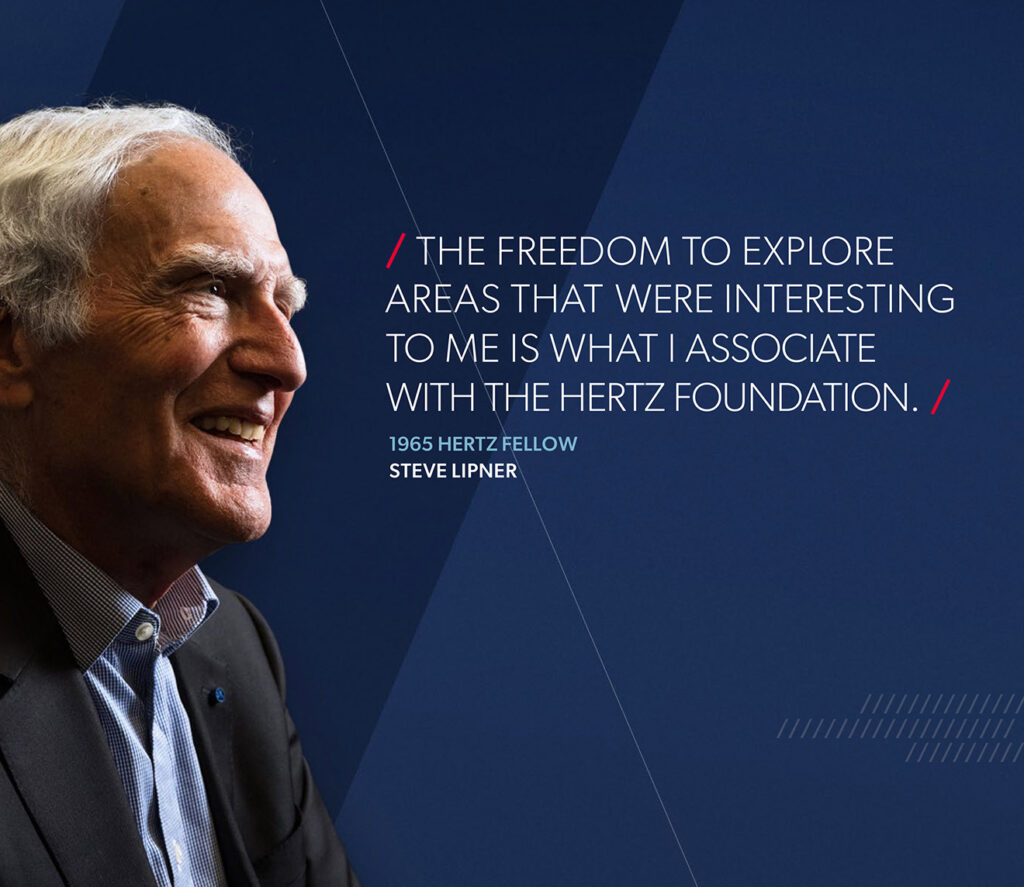
Donor Profile: Steve Lipner
For cybersecurity pioneer and Hertz Fellow Steve Lipner, the concept of freedom is at the core of his giving to the Hertz Foundation.
Newly elected to the Hertz Foundation board of directors, Lipner shares with the entire Hertz community an unwavering commitment to applying his talents to the most pressing challenges facing our nation and world.
“There are many different educational needs in this country; one is identifying people who can make a difference and giving them the freedom and opportunity to make significant contributions,” says Lipner. “It’s important to society.”
That’s just one reason he and his wife, Anne, funded the Steve and Anne Lipner Endowed Fellowship, currently held by 2023 Hertz Fellow Freja Ekman.
A second reason for his gift was a commitment he made long ago. Lipner still has the Hertz Engineering Scholarship agreement he signed in 1961 spelling out the request. Recipients were asked to contribute, when able (and here Lipner reads from the agreement) “a sum or sums comparable to the financial assistance which I shall have received as to make possible the education and training of another student needing such assistance,” he pauses. “I think I’ve had that in the back of my mind for 62 years.”

Lipner was among the last students to receive the Hertz Engineering Scholarship, which funded his undergraduate education at Massachusetts Institute of Technology, where he received a B.S and later an M.S. in civil engineering. In 1963, when the Hertz Foundation phased out undergraduate scholarships and shifted support to PhD students, Lipner applied. His memory of walking—on a snowy, slushy Sunday—to his interview with legendary physicist Edward Teller and the founder of MIT’s renowned Instrumentation Laboratory, Charles Stark Draper, is clear. “I remember getting my feet soaked,” he says. Initially not selected for the fellowship, he was listening to one of Muhammad Ali’s 1965 championship boxing matches on the radio when he was summoned to the dorm hallway phone to accept a longdistance call. It was a Hertz Foundation administrator. A recipient was unable to accept the fellowship, and Lipner was the next runner-up. He remained at MIT for graduate work, intending to focus on transportation.
“I stayed at MIT for four years, but did not wind up with a PhD. I got sucked into project work leading software development teams.” This is where he realized the enormous value of the Hertz Fellowship. “It gave me a lot of freedom. I took more and more courses in what would now be called computer science. I eventually decided that the software world was more of what I wanted to do.” Lipner left his studies at MIT in 1969 and went to work for a defense contractor.
“The combination of having run a software group during graduate school and the coursework I took, much of which was theoretical, gave me a good basis for what’s now called cybersecurity, which I have been doing for 53 years,” he says.
Lipner joined Microsoft in 1999 and developed a radical strategy to combat widespread 2001 “worm” incidents. The initial strategy halted the work of all 8,500 Windows developers and shifted focus to security improvements, enabling Microsoft to make rapid advances in product security. The practice became known as Security Development Lifecyle (SDL), today the industry’s leading secure software development process.
Prior to his Microsoft retirement in 2015, many companies had adopted SDL and its variations, leading to the founding of SAFECode, a global nonprofit that promotes the exchange of ideas to improve scalable software security programs. Lipner served as SAFECode board chair while with Microsoft and is currently its executive director. He also serves as chair of the U.S. Government’s Information Security and Privacy Advisory Board, and he is adjunct professor of computer science at the Institute for Software Research, School of Computer Science at Carnegie Mellon University. He was elected to the Cybersecurity Hall of Fame in 2015 and the National Academy of Engineering in 2017.
“My friends tell me I have flunked retirement,” he says. For Lipner, retirement means having the freedom to keep pursuing what interests him—much like the opportunity presented six decades ago by his Hertz Fellowship.
“The freedom to explore areas that were interesting to me is what I associate with the Hertz Foundation. Looking back, I had a lot of opportunity to do what was appealing and challenging. There was probably a fair amount of luck associated with it, but it turned out very well.”